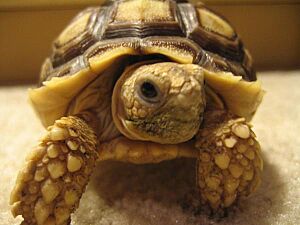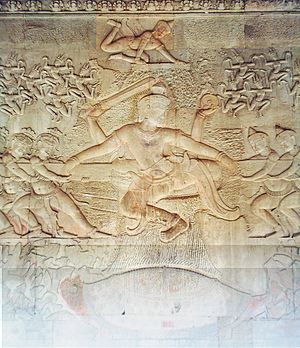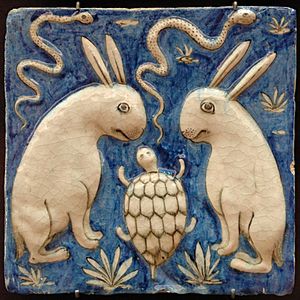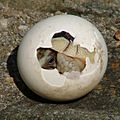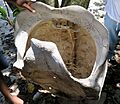Tortoise facts for kids
Quick facts for kids Testudinidae |
|
|---|---|
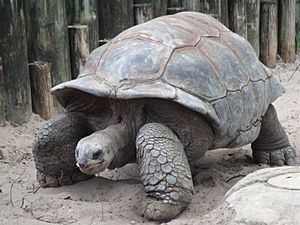 |
|
| Aldabra giant tortoise (Aldabrachelys gigantea) |
|
| Scientific classification |
|
| Kingdom: | Animalia |
| Phylum: | Chordata |
| Class: | Reptilia |
| Order: | Testudines |
| Suborder: | Cryptodira |
| Superfamily: | Testudinoidea |
| Family: | Testudinidae Batsch, 1788 |
| Type genus | |
| Testudo Linnaeus, 1758
|
|
Tortoises ( tor-TƏS-iz) are amazing reptiles that belong to the family Testudinidae. They are famous for their strong, protective shells. Like other animals in their group, called Testudines, tortoises can pull their heads and necks straight back into their shells when they feel threatened. This helps keep them safe from predators.
Tortoises come in many sizes. Some, like the Galápagos giant tortoise, can grow over 1.2 meters (4 feet) long! Others, like the speckled Cape tortoise, are tiny, with shells only about 6.8 centimeters (2.7 inches) long. Many types of giant tortoises have evolved to be very large, weighing more than 100 kilograms (220 pounds).
These animals are usually active during the day, especially when temperatures are just right. They tend to be shy and prefer to live alone. Tortoises are known for living a very long time, often between 80 and 150 years. Some have even lived much longer! For example, an Aldabra giant tortoise named Adwaita might have lived for an incredible 255 years. Tortoises are also famous for being slow movers.
Contents
What's the Difference: Tortoise, Turtle, and Terrapin?
The words "turtle," "tortoise," and "terrapin" can sometimes be confusing! In general, scientists use "turtle" for all animals in the Testudines group, whether they live on land or in water.
However, most people use "tortoise" to specifically describe the slow-moving animals that live only on land. These are the ones with the strong, dome-shaped shells that we are learning about today. "Terrapin" usually refers to smaller turtles that live in fresh or slightly salty water.
So, remember: all tortoises are a type of turtle, but not all turtles are tortoises!
The Amazing Life Cycle of a Tortoise
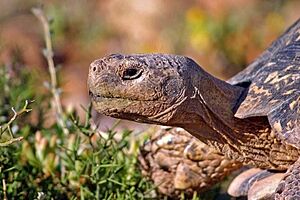
Most female tortoises lay a small number of eggs, usually fewer than 20, and sometimes just one or two. They typically lay their eggs at night, carefully covering them with sand, soil, and plants. The mother then leaves the eggs, which will hatch on their own.
The eggs take a long time to hatch, usually between 100 and 160 days. When a baby tortoise is ready, it uses a special "egg tooth" to break out of its shell. Then, it digs its way to the surface of the nest and starts its life alone.
Baby tortoises are born with a special food sac that gives them energy for their first few days. This helps them get strong enough to find their own food. Young tortoises sometimes eat different things than adults. For example, baby tortoises of plant-eating species might eat worms or insect larvae for extra protein.
You can sometimes guess a tortoise's age by counting the rings on its shell, similar to tree rings. However, this isn't always accurate because growth depends on how much food and water they get.
Tortoises are famous for living a very long time. Some have lived for over 150 years! Because of this, they are symbols of long life in many cultures. One of the oldest known tortoises was Tu'i Malila, who lived for 188 years and passed away in 1965. Another, Adwaita, an Aldabra giant tortoise, was believed to be 255 years old when it died in 2006. Harriet, a Galápagos tortoise, lived to be almost 176 years old, dying in 2006. Timothy, a female spur-thighed tortoise, lived to about 165 years, passing away in 2004. And Jonathan, a Seychelles giant tortoise on St Helena island, is thought to be over 190 years old today! Scientists are even studying the DNA of these long-lived tortoises to understand their secrets to a long life.
How Male and Female Tortoises are Different
In many tortoise species, males and females look a bit different. This is called sexual dimorphism. For example, in some species, males have a longer neck plate. In others, females might have longer claws.
One easy way to tell them apart is by looking at their tails. Females usually have shorter tails that point downwards. Males have much longer tails that are often held up and to the side of their shell. Also, a male tortoise's bottom shell (called the plastron) is often curved inwards. This helps them during reproduction.
The Tortoise Brain
Tortoises have very small brains. For example, Red-footed tortoises don't have a part of the brain called the hippocampus, which helps with emotions, learning, memory, and finding your way around. Instead, studies suggest they might use another part of their brain, called the medial cortex, for emotional actions. Humans use this part of the brain for things like making decisions.
Where in the World Do Tortoises Live?
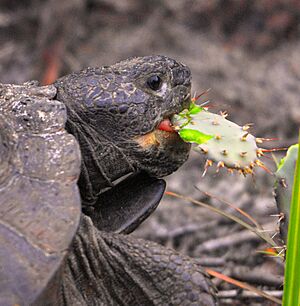
Tortoises live in many parts of the world! You can find them from North America down to South America, around the Mediterranean Sea, across Europe and Asia to Southeast Asia, in Africa, Madagascar, and on some Pacific islands. However, you won't find them living naturally in Australia.
They live in all sorts of places, from hot deserts and dry grasslands to wet forests and even mountains. Most tortoises prefer places that are semi-dry.
Many large islands are home to giant tortoises. This is partly because tortoises are good at traveling across oceans. Even though they can't swim, they can survive for months without food or fresh water while floating at sea. Some tortoises have traveled over 740 kilometers (460 miles) this way! Once on an island, they often had few predators and could grow very large.
Today, only two types of giant tortoises still live: the Aldabra giant tortoise and the many kinds of Galapagos giant tortoise. Sadly, many other giant tortoise species on islands around the world were wiped out after humans arrived.
What Do Tortoises Eat?
Tortoises are mostly herbivores, which means they eat plants. Their diet usually includes grasses, weeds, leafy greens, flowers, and some fruits. Interestingly, some tortoises have occasionally been seen hunting and eating birds!
Pet tortoises need a diet based on wild grasses, weeds, leafy greens, and certain flowers. Some species in their natural homes also eat worms or insects. It's important for plant-eating tortoises not to get too much protein, as this can cause health problems and shell deformities. Different tortoise species have different food needs.
How Tortoises Communicate
Tortoises communicate in ways that are different from many other reptiles. Because their shells and short legs limit how they move, they don't rely much on visual communication.
Instead, tortoises use their sense of smell to figure out the sex of other tortoises, which helps them find a mate. Tactile communication, or communication through touch, is also important, especially during fights or when they are trying to find a mate. In both these situations, tortoises might gently bump or ram each other to communicate.
Tortoise Family Tree
All tortoises belong to the family Testudinidae. Within this family, scientists group them into different genera (like a smaller family group) and then into individual species. There are many amazing kinds of tortoises around the world, each with its own unique features!
Tortoises in Culture
Tortoises in Stories and Beliefs
Tortoises have been important in human stories and beliefs for a very long time!
In Hinduism, Kurma was the second form, or Avatar, of the god Vishnu. Vishnu appeared as a half-man, half-tortoise. He sat at the bottom of the ocean, and a mountain was placed on his back. The other gods then churned the sea to find ancient treasures.
In Chinese and Japanese folk religions, tortoises were seen as animals that could predict the future. Ancient Chinese people even used tortoise shells as "oracle bones" to make predictions.
In Ancient Greek stories, the god Hermes made the very first lyre (a musical instrument) from a tortoise shell.
Tortoises in Space
Did you know tortoises were pioneers in space? In September 1968, two Russian tortoises became the first animals to fly to and circle the Moon! Their mission, called Zond 5, brought them back to Earth safely. This happened long before humans landed on the Moon.
Tortoises as Pets
Many people keep tortoises as pets. They are fascinating animals, but they need special care, including the right diet and a suitable environment, to stay healthy and live their long lives.
Images for kids
-
Baby Testudo marginata emerges from its egg
-
Young, 20-year-old Tanzanian leopard tortoise feeding on grass
-
22-year-old leopard tortoise
-
African spurred tortoise from the Oakland Zoo
-
Young Testudo hermanni
-
A skeleton of Aldabra giant tortoise found in Cousin Island (Seychelles)
-
Radiated tortoise (Astrochelys radiata)
-
Red-footed tortoise (Chelonoidis carbonarius)
-
Galápagos giant tortoise (Chelonoidis niger)
-
Speckled padloper (Chersobius signatus)
-
Indian star tortoise (Geochelone elegans)
-
Gopher tortoise (Gopherus polyphemus)
-
Elongated tortoise (Indotestudo elongata)
-
Impressed tortoise (Manouria impressa)
-
Greek tortoise (Testudo graeca)
See also
 In Spanish: Testudínidos para niños
In Spanish: Testudínidos para niños
 | James B. Knighten |
 | Azellia White |
 | Willa Brown |


